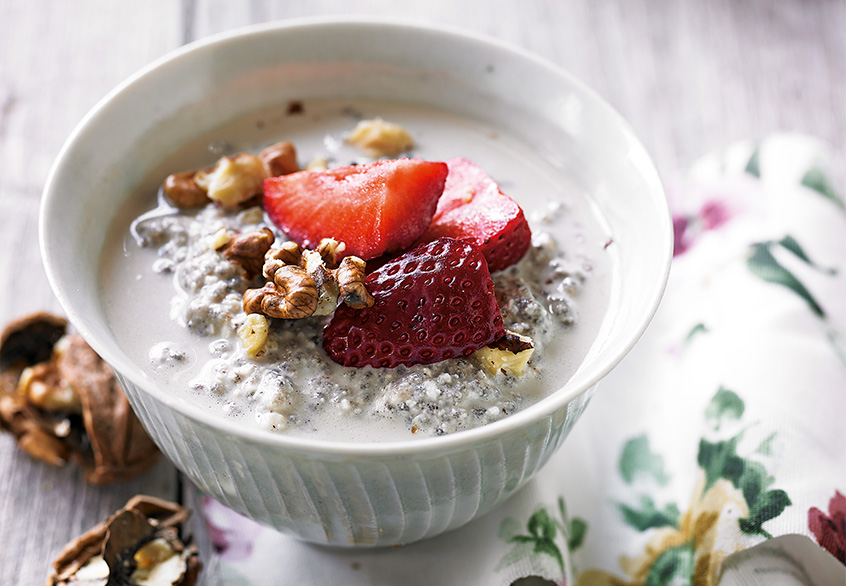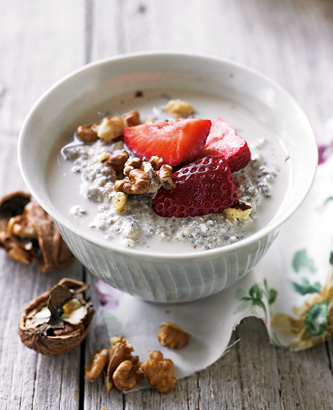
Energy zappers are all around us. Some are obvious—stress, work, relentless commitments, financial concerns. Others are subtler, like nutrient deficiencies or dehydration. When achy muscles and fatigue tell you you’re totally tapped out, resist the urge to hunt down the nearest energy drink, coffee or chocolate bar. Those quick fixes will eventually have a detrimental effect on your health. Opt for natural alternatives that will provide long-lasting results. Here are my top five Supercharged tips to amp up your energy level:
1. Don’t Skip Meals (Especially Breakfast)
Folks who eat breakfast regularly report having more energy and being in a better mood throughout the day. Breaking the fast soon after rising, fuels your body with nutrients that will set the tone for your whole day. In fact, missing any meal during the day has been shown to lead to a greater feeling of fatigue by day’s end. Eating every two to three hours will ensure your metabolism is continuously humming along and your blood sugar levels don’t drop significantly.
Keep snacks like nuts, muesli bars, and fresh fruit on hand to snack on throughout the day.
2. Increase Your Magnesium Intake
Eating a balanced diet rich in whole foods ensures your vitamin and mineral needs are being met. However, in most western nations where our diets are relatively poor and filled with processed foods, magnesium deficiency is more common than expected.
This vital mineral is needed for more than three hundred biochemical reactions in the body, including the breakdown of glucose into energy. Even when magnesium levels are just a little lower than normal, energy levels can drop significantly.
The current recommended intake of magnesium for adult men and women is 350mg/day. This can easily be achieved through diet alone, and supplementation is usually not necessary except in special circumstances. Some rich sources of magnesium include nuts (such as almond and cashews), whole grains and oily fish.
3. Reduce Stress
Stress consumes a surprisingly large amount of energy. Have you ever noticed before an exam or presentation you feel as though you could devour an entire shopping aisle? Stress can leave you feeling mentally and physically exhausted, even if you’ve been physically inactive, because your sympathetic nervous system is working overtime, keeping you in “fight” mode. Even mild but chronic stress inducers (getting stuck in a traffic jam, being late for work, receiving the evil eye from your boss) erode energy levels, so over time you find you’re expending less due to fatigue but feeling it more due to lack of reserves.
Sure some stressful situations are out of your control, but the good news is that you can counter these energy zappers naturally, by scheduling more relaxation activities into the day. It can be as easy as taking a short time out for meditation and to practice deep breathing exercises.
Stress increases your body’s need for vitamin C, as it uses this nutrient to suppress formation of the stress hormone cortisol. It’s been found that taking a vitamin C supplement of 3,000mg daily can reduce your stress response. Try three Ester-C Plus 1000mg Vitamin C Tablets every single day.
4. Swap Alcohol, Tea and Coffee for Water
It’s easy to confuse signals of hunger with thirst. Similarly, thirst can also disguise itself as fatigue. As our bodies are comprised of over 75% water, even slight dehydration can leave you feeling tired and lethargic. The solution is simple: drink more water, particularly to boost energy after exercise, when your body is more likely to be craving fluids. Ease up on alcohol and coffee, as not only will these further dehydrate you, but they’ll trick your mind into thinking it is having fluids, so you’re less likely to reach for your water bottle.
It’s also important to watch your fluid intake during winter, when we are cold, sweat less, and are therefore less likely to drink. Enjoying warm, nourishing soups are a great way to stay hydrated during the chilly season.
5. Load up on Energy Boosting Spices
Spices are underrated. Turmeric, cinnamon, cumin, ginger and cardamom all have antioxidants to boost energy levels, normalize blood sugar levels, and promote good circulation that will in turn enhance the blood supply to the brain.
For example, just half a teaspoon per day of cinnamon can help improve your insulin sensitivity, reducing dips in energy. Fennel seeds are rich in quercetin, a nutrient proven to rev your aerobic capacity, even without exercise. Recent studies also show it can ramp up sugar metabolism.
Lee’s Energizing Chai Chia Breakfast Pudding Recipe
Serves 4
Stuck for a breakfast idea that will switch on your senses and entice a happy morning mood? This chai chia breakfast pudding will do just the trick. Full of antioxidants, vitamins, essential fatty acids and an exotic blend of chai spices, this pudding will fill you with joy.
Ingredients
1/4 teaspoon Celtic sea salt (we like Eden Foods brand)
1/4 cup hazelnuts
3/4 cup raw cashews
1/2 teaspoon alcohol-free vanilla extract
6 drops stevia liquid, or 2 tablespoons sweetener of your choice
1/2 teaspoon cardamom
1/2 teaspoon nutmeg
1/2 teaspoon ground cinnamon
1/4 cup chia seeds
1/2 cup chopped nuts, to serve
strawberries, to serve (optional)
almond milk, to serve
Supercharge It:
Combine the salt, hazelnuts, cashews, vanilla, stevia and spices with 750 ml (26 fl oz/3 cups) of filtered water in a blender and whizz until smooth.
Transfer to a bowl and add the chia seeds. Stir to combine well, then cover and place in the fridge overnight.
To serve, scatter with chopped nuts and strawberries, if using, and add almond milk.
Why we love it:
Chia seeds are teeny tiny, but impressively clever. When soaked in water they transform into a highly detoxifying gel. They absorb other flavors well.









